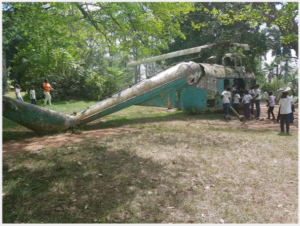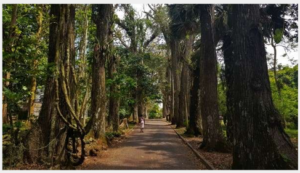Latifah Idriss, an Accra-based architect and conceptual artist, is recounting to me the question she asked a friend when they first visited Aburi, a mountain town northeast of Accra. She’s very familiar with the topic of Ghana’s record-high pollution. For an arts festival she once installed a day’s worth of plastic waste from Accra’s beaches in Ussher Fort, a dilapidated prison, and added mirrors onto the walls so visitors could see themselves in the trash they generate.
Aburi is an escape from Ghana’s traffic- and waste-clogged capital. Forty-five minutes away (or less, depending on how enthusiastic you are to get there), the town is a carpet of green — mountains, hills, banana and palm trees — bursting in every direction. Located in the Akuapim South municipal district of Ghana’s eastern region, it is part of the Akwapim-Togo mountain range, with hills averaging 1,500 feet. Hills hushed in silence, interrupted by the occasional songful chirp of birds.
With a population of only 18,701 (2013 census), Aburi is a town where “urbanization or development has not damaged anything,” according to Tsatsu Amble, an editor with Daily Graphic, a Ghanaian newspaper. “They have tried to keep the natural beauty of the place,” he says.
 This is most evident in Aburi’s most famous tourist attraction. The Botanical Gardens (20 GHC, or $5), opened in 1890 and occupying about 64.8 hectares of land, is home to 350 plant species and is literally the seedbed of the production of cocoa and rubber in southern Ghana. It’s the perfect place to set up a picnic, lie in the grass, listen to the whistle of trees and enjoy the cool air. There are also birds and butterflies to spot. Centuries-old trees to marvel at. A picturesque procession of palm trees at the entrance.
This is most evident in Aburi’s most famous tourist attraction. The Botanical Gardens (20 GHC, or $5), opened in 1890 and occupying about 64.8 hectares of land, is home to 350 plant species and is literally the seedbed of the production of cocoa and rubber in southern Ghana. It’s the perfect place to set up a picnic, lie in the grass, listen to the whistle of trees and enjoy the cool air. There are also birds and butterflies to spot. Centuries-old trees to marvel at. A picturesque procession of palm trees at the entrance.
This is a place you would come to let go, douse tensions of any magnitude — even those of an impending war.
About seven minutes away, there’s the Aburi Craft Village, a sprawling expanse of 120 shops dealing in the arts of wood and textiles. Woodworks is one of the biggest industries of the Aburi people, and their art pieces are exported to Nigeria, Senegal and as far away as South Africa, according to Nana Krobea Asante 1, an Aburi chief and president of the Craft Village. Here, almost everything is carved by hand: high chairs, drums, masks, sculptures. You may also find kente tunics and bags made abroad.
Although Aburi is isolated, it can also get city-style noisy at times. Funeral ceremonies, which are historically and culturally huge parties in Ghana that can go on for up to three days, tend to disturb the community peace, according to Kumiwaa, an Aburi native. But a law now limits funeral parties to weekends only.
 Still, it’s “a friendly place and one of the most hospitable towns in Ghana,” Asante maintains. It is. He takes me on an unscheduled tour around the village, explaining in detail the origins of its wood market. Kumiwaa recommends the best place for a view of the mountains. The townspeople gladly give directions to navigate their turf.
Still, it’s “a friendly place and one of the most hospitable towns in Ghana,” Asante maintains. It is. He takes me on an unscheduled tour around the village, explaining in detail the origins of its wood market. Kumiwaa recommends the best place for a view of the mountains. The townspeople gladly give directions to navigate their turf.
In 1967, Aburi was the chosen venue for peace talks between Nigeria and then breakaway Biafra before the civil war of 1967–1970. Standing here in the fresh mountain air and lush verdant scenery, it’s not hard to see why. This is a place you would come to let go, douse tensions of any magnitude — even those of an impending war. This one in question did go on, but Aburi has remained a getaway fit enough for Ghanaian presidents, statehouse guests, celebrities escaping their busy worlds. It is good for you too.
Stay there: Aburi
- The Hillburi Resort ($150 per night): A rustic resort on a hill in Aburi with gorgeous views of the surrounding mountains. At the restaurant, try the yam chips and chicken with a side of shito, a chili sauce local to Ghana.
- The Lansdown, Aburi ($140 per night): Carved out of a mountainside, this hotel offers a modern interior in an ancient space. You might just spot a Ghanaian celebrity on the tennis court.
-msn




